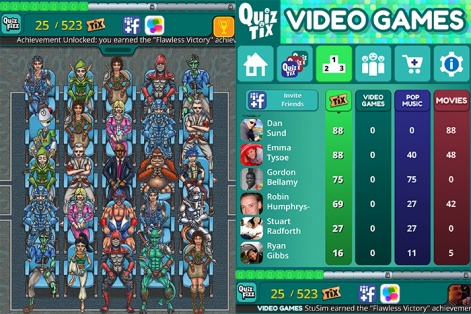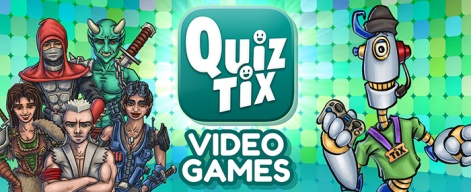Know any football experts? How many of them also have an in- depth knowledge of pop music? And what's their handle on Hollywood movies like? Do they also have a grasp on videogame trivia?
Rare are the folk who could claim to be an expert in all such areas and, as a result, even rarer are quiz games that attempt to combine such a diverse range of subjects. QuizTix, however, covers all the aforementioned areas, tying them together under one brand, yet fanning them across individual titles.
Your score is carried across all the releases, with a leaderboard tallying your total up against your friends. Not up to date with Madonna's back catalogue? Skip QuizTix: Pop Music, then, and instead bolster your score with your Premier League prowess in QuizTix: World Football.
It's a tactic that appears to be working for the two men behind it – creative director Ian Masters and commercial director Albert Marshall – too. As a whole, QuizTix just announced that users have answered their 10 millionth question.
We caught up with the two men to talk about the game's journey to date, and how it feels to be competing on the ever-competitive quiz genre.
Pocket Gamer: QuizTix has just hit 10 million questions answered across the entire range, but the range itself has had something of a staggered roll-out – the Music quiz the first out of the traps, with the most recent release QuizTix: Video Games taking the library to four. Why split the games in such a way? Were you tempted to launch it as one mega release?
Ian Masters: Well we actually launched with two versions: movies and pop music, but with each subsequent game we add new features and roll them in to the previous versions too.
Each QuizTix game allows us to reach a new audience with a game that’s all about that topic, and each has detailed environments and original characters so with all the assets they come in at around 35 megabytes. We wouldn't be able to stay under the over-the-air limit if we bundled them all together.

Critically though, we’re not trying to keep players in one game but instead to keep them engaged across the series. With two to four weeks of casual play, content in each the catalogue approach allows players to pick and choose the subjects that interest them, enjoy them and move on to the next.
Albert Marshall: We thought long and hard about this. So far, the advantage of being able to use each launch as a way to raise the profile of QuizTix generally and really speak directly to new audiences with a version of the game that looks and feels like something thing they would be interested in, is something that is really important.
Off-line play is also something we think is vital too and is a real part of casual players’ expectations at the moment, across global audiences.
Key to QuizTix, however, is your ability to see your score and those of your friends across the entire range. I assume this is a canny way of cross-promoting other games in the series...
IM: Absolutely. From the outset we invested quite heavily in the development of the QuizTix back-end to allow as much interaction between games as possible. As well as the scoreboards we also have cross-game friends’ history so you can see what your friends are up to no matter which version you or they are playing.
AM: Although QuizTix is has a central single player experience, these features - along with the ability to see friends’ times in questions, and sharing questions via social media - make it feel like a very social experience.
The quiz and trivia market is no pushover. Why make a move into such a competitive field, and who would you say your prime competition is now you're here?
IM: Well I had the basic concept and built the prototype over two years ago when the quiz genre was a lot less crowded.
The quiz and trivia genre is a very noisy place to be now.Ian Masters
Not too long after that I remember seeing Logo Quiz by AticoD and thinking, wow, this really proves the collectable element is great fun and something people enjoy doing. It was sad to see how quickly that was cloned and if you don’t know what you’re looking for it’s now too easy to find the clones first.
In fact, Logo Quiz and a few other original concepts like 4 Pics 1 Word and SongPop have spawned so many derivatives - some of them excellent, I have to say. But, yeah, you’re right, it’s a very noisy place to be now. We'd like to think our unique catalogue approach, social features and original design will help us cut through.
AM: Also, there is a wider cultural point that, compared to how much people love knowledge, trivia and quizzes, I think proper and entertaining quizzes that work on mobile are actually under-targeted.
In all media, this type of "knowledge entertainment" is king. From Top Gear, to MasterChef, the various property development programmes, and the more direct quiz shows, there is evidence that quiz games can appeal to a large market that goes beyond targeting traditional games audiences.
You've taken the decision to adopt both in-app purchases and adverts to monetise the QuizTix library. Whereabouts does the revenue split between the two lie? Would it be fair to describe the way the ads are implemented as something of a safety net – a way of ensuring non-paying players still contribute to the revenue pot, as it were?
IM: We didn’t have the luxury of a soft launch so we were intentionally generous with content and gentle with the advert mechanics.
At launch we only had 15 second video ads that were opt-in only, meaning you only ever saw an advert if you asked to see one in exchange for some Quiz Fizz, which is our energy system. Much to our surprise, actually, people were watching a lot of adverts from day one and they were immediately accounting for around 40 percent of revenues.
Sure we can optimise the in-app-purchases and have plans to do so but we see ads as the real opportunity for the games and we expect over half of revenues to come from ads within a couple of months. Adverts shouldn’t be a punishment as they are used in so many games- if they're used in the right way they can be used to provide better value to all users on a largely opt-in basis.

AM: I think we are going to see a huge change in mobile advertising, more brands are choosing to advertise on mobile and the eCPMs are being driven up. With more creative input and technology, adverts will become less crappy and more relevant to players and thus people will have much less of a problem with them.
Therefore developers will be able to make more money from advertising, in a way that is based on respect for, and consent from, the player. I’m one of those strange people that think good relevant advertising is actually entertaining and informative - we just need more Mad Men.
What ties the games together is the host, Quizbo. How easy was it to ensure he fitted in across the entire range, and how have you deployed him across social media?
IM: [Laughs]. Quizbo is key. We actually went for a robot host for that exact reason, because we needed a host who could match any subject.
AM Ian just puts a different hat on him. Everyone loves a hat!
IM: As you say, he is also the face of QuizTix on Twitter as @Quizbo. It’s nice to have a character talking to people rather than a company.
There's surely the opportunity to expand his appeal beyond the games themselves? Have you talked to anyone about Quizbo merchandise?
AM: Yes, we have had a great response from the public, including a few, err, weird responses to his Tinder profile...but, yes, we are going to explore merchandising. So much to do at the moment, but we believe that games companies should try to explore as many ways of making income which are relevant and make sense to them, as possible.
How has your respective experience in console development helped or hindered you in the mobile world? Do the two fields remain poles apart, or are the two sectors starting to merge from the perspective of the developer?
IM: Well I started on console back in 98 but have actually been focused on mobile since 2003 when I made Super Yum Yum. Over that time I’ve gotten to work on bringing some big console brands to mobile like Chu Chu Rocket, Sonic and Locoroco. It’s design challenges like that that are the most fun.
I think the best companies in console and mobile are passionate about their games. That is what matters to me.Albert Marshall
With QuizTix the challenge was to take a genre like quiz games which has true casual and mass market potential, but add a deeper experience more in line with traditional games whilst keeping it as accessible as possible. We hope we’ve managed to achieve that. We’ve certainly had plenty reports from friends and colleagues who say their partner is addicted and they "don’t usually play games".
AM: I think the best companies in console and mobile are passionate about their games. That is what matters to me, and what makes being in this industry fun and worthwhile. The important thing with any platform is to think about what really works for that platform, whether it is PlayStation 2 or Android phones, and therefore I think there are a quite a few things which apply across the board.
One major difference for me from working for a big games companies with established distribution and marketing channels, and small mobile games companies, is the question of how do people discover your games. I have probably had a few hundred conversations about this and I think there are many different valid answers.
One of the answers is to start by knowing your audience and where they are, and if you have no money, be creative, relevant, and sometimes dangerous!
How difficult was it making that move in the first place? Was it hard to find financial backing?
AM: I think people thought I was a bit crazy when I told them about my plans to co-found a games company. They thought it was a bit like that joke: "How do you become a millionaire mobile games developer? Start as a bllionaire..." [Laughs]
What has been easy and a pleasure was being lucky enough to start with an amazing talented team of people to get four great games done in a ridiculously short period of time on a crazily small budget. What was difficult was pitching to VCs and being asked the question "What is the problem your business is trying to solve?" That used to make me grind my teeth.
What helps with fund raising is really breaking down and understanding the financial side of your business. Be honest about prospects, but show the real potential that is out there from a financial point of view, thinking about all the potential revenue streams. Let investors know how great games fans are. Research this. Talk to everyone. Most importantly: "If you want money ask for advice, if you want advice ask for money", or something like that.

IM: Ultimately, I'd say raising money is all about providing potential for huge growth and minimising risk. By nature QuizTix is very scalable so that helped for sure. For managing risk, the biggest part is having the right team.
That’s where I think my dev experience and Albert’s legal and commercial expertise really helped. Having the right set of guys and girls to actually make the game was critical too of course and we couldn’t be happier with how everyone has pulled together - all without an office.
Finding funding for games is always hard so I have a lot of respect for anyone who manages to do it, for however much or little money.
What are your plans looking ahead? QuizTix is surely ripe to be re-skinned in multiple different colours. Have you had many companies approach you about licensing their brands?
AM: We definitely want to work with companies that are associated with interesting history, data and stories. We think we can work with them to use this to engage, entertain, inform and expand their audiences. We have started discussions with a few well-known names, but it needs to be the right partner. You will not see us doing a quiz about paint. Well, okay, never say never. [Laughs]
IM: "Reskinned" is such a cynical word but I can see why you might use it. We see the games as constantly evolving, with new features being added each update. The fact that we also release a new version with new content is just an extension of the game we’re building, and an opportunity to bring a new set of players in to the QuizTix family.
Going forwards our goal is to strike the balance between new original games and branded versions.
Thanks to Ian and Albert for their time.





















